Sir John Monash, Personal Files Book 1, 5 November - 15 December 1914 - Part 5
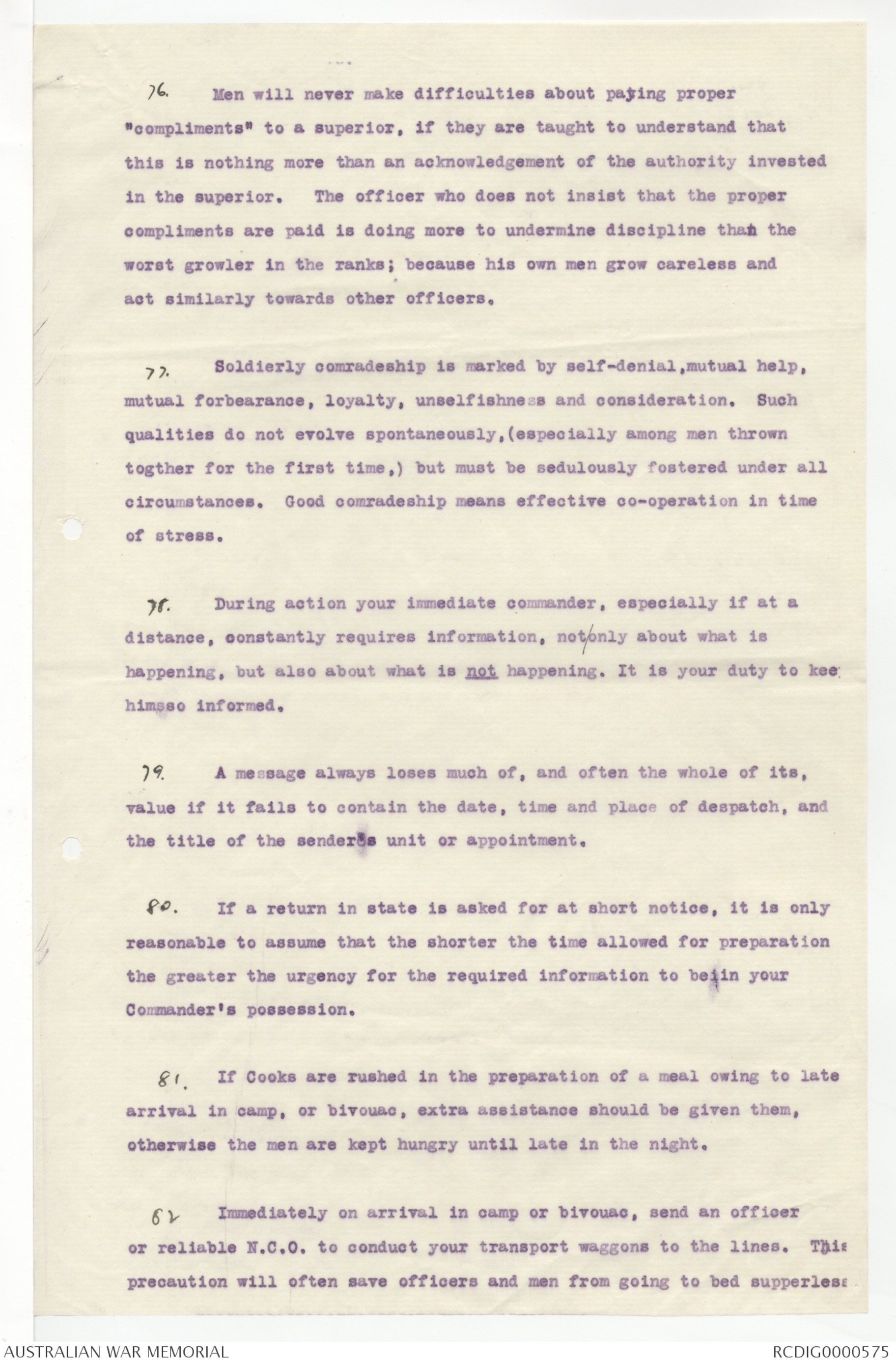
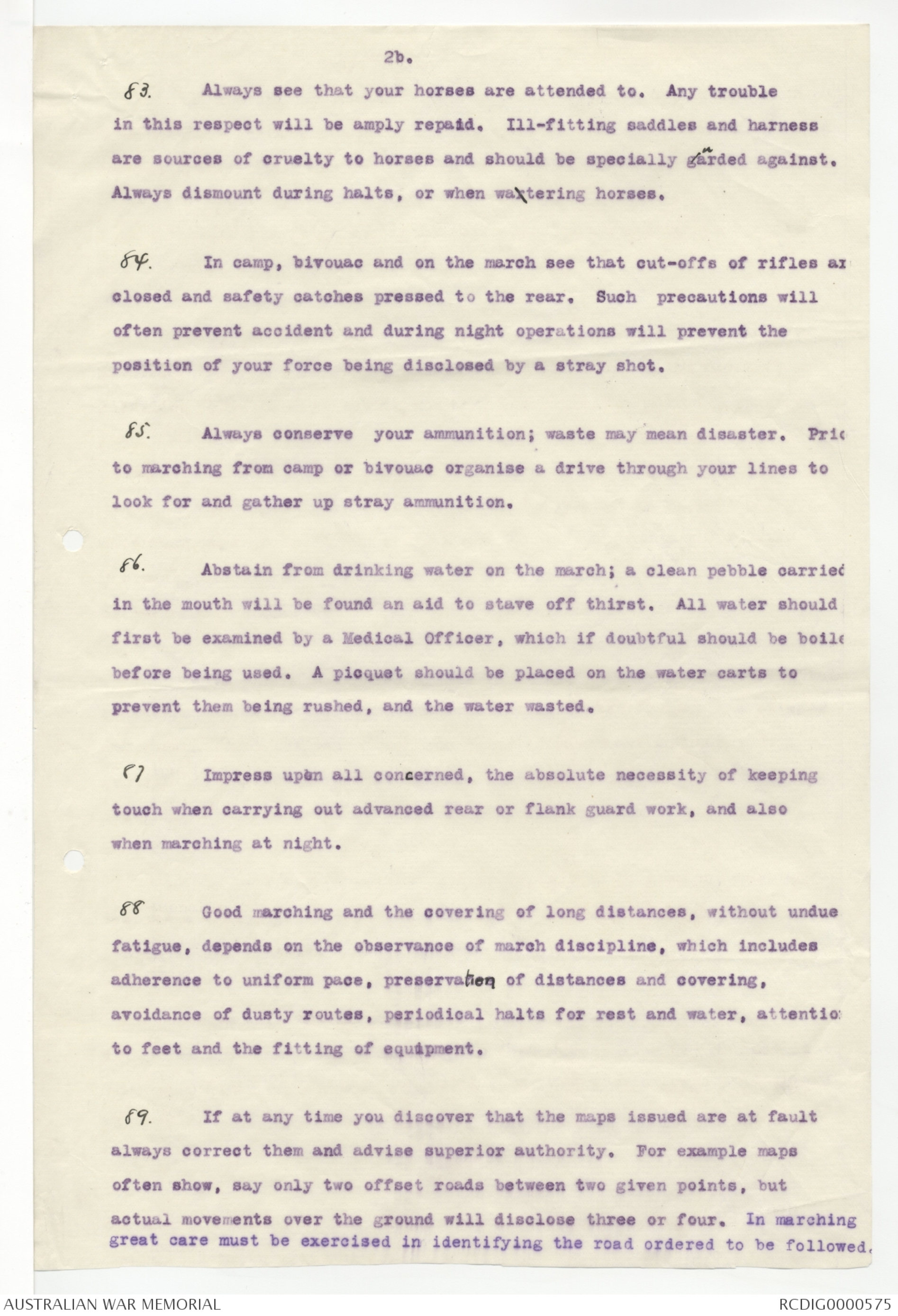
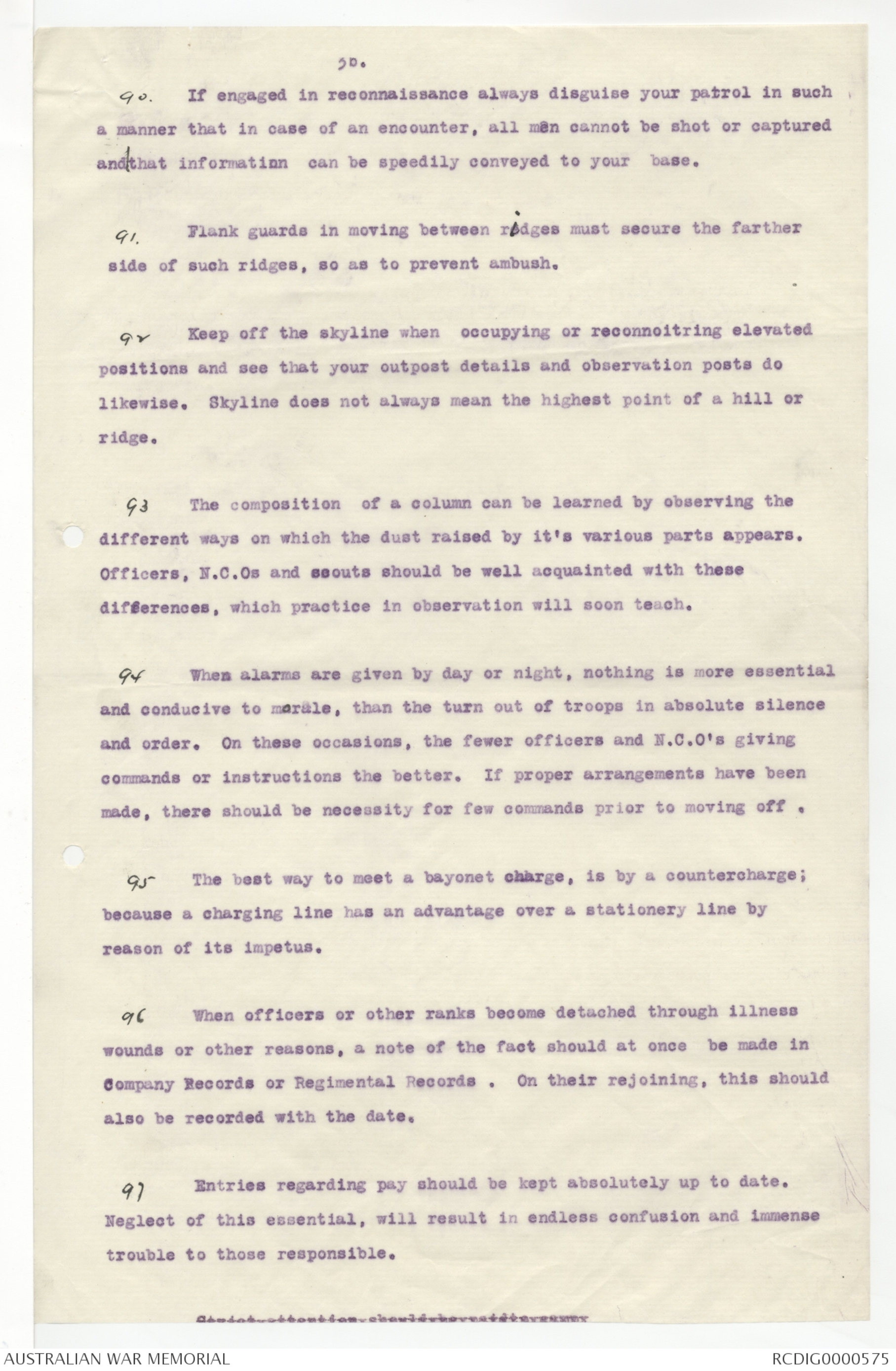
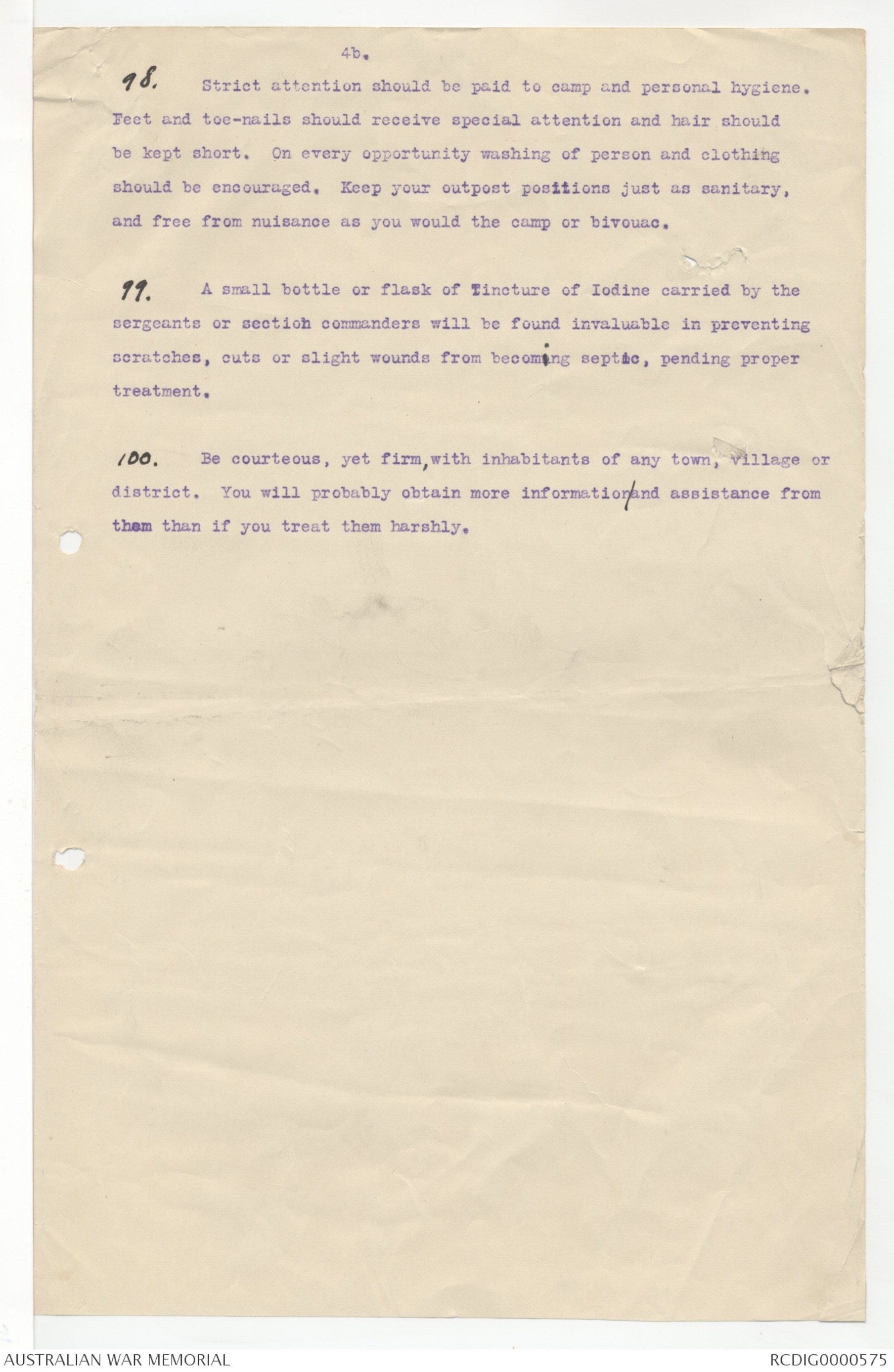
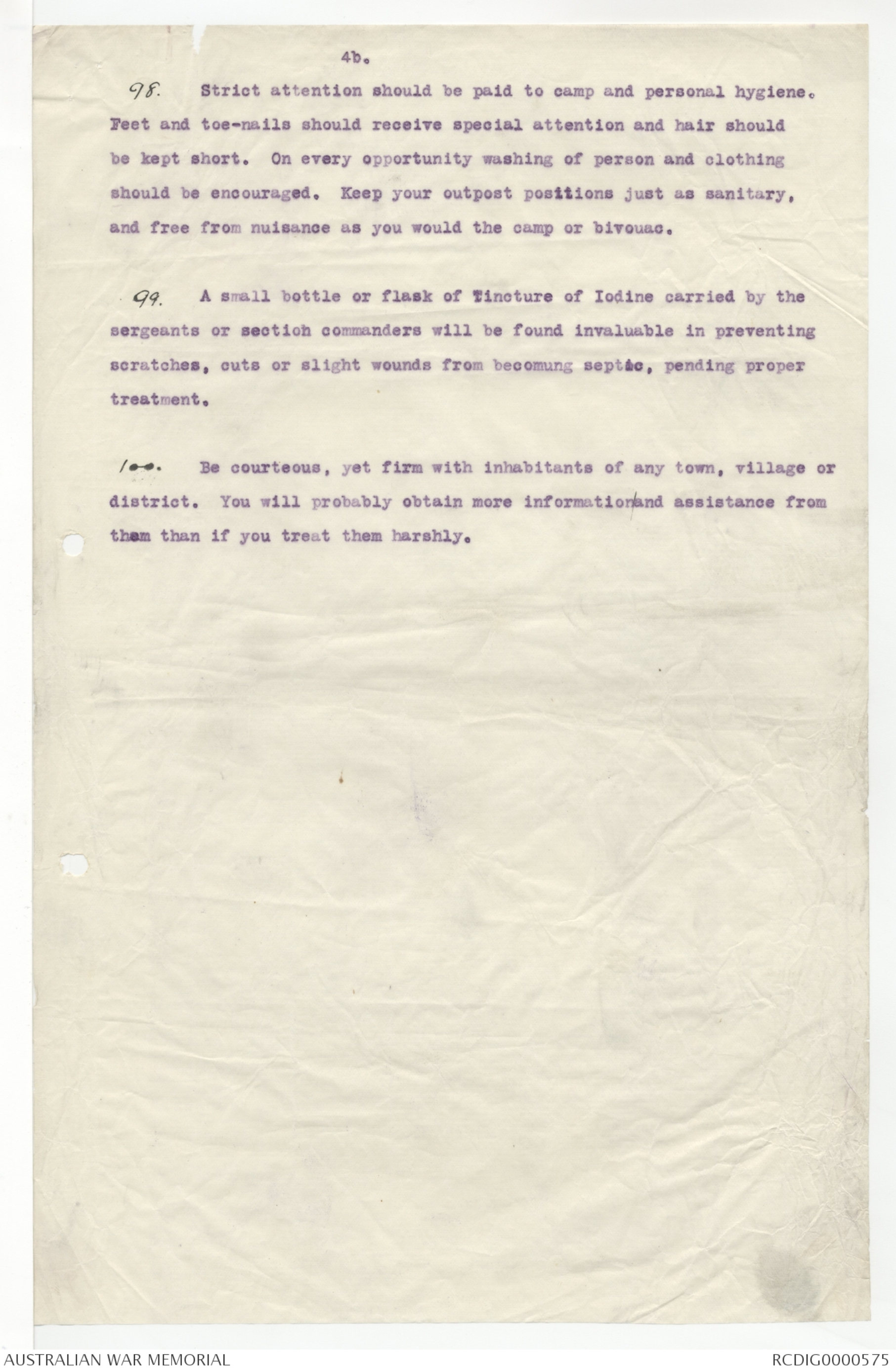
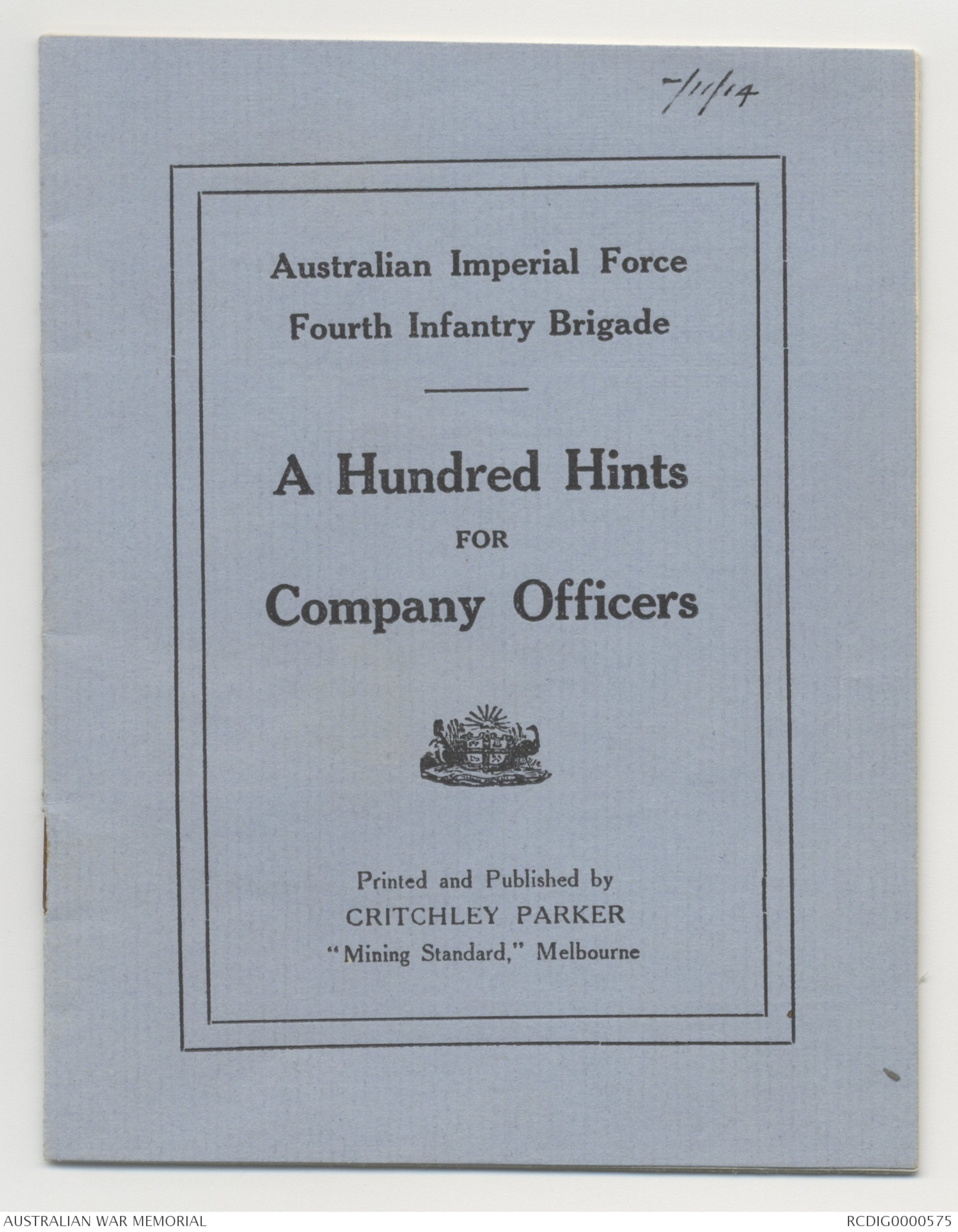
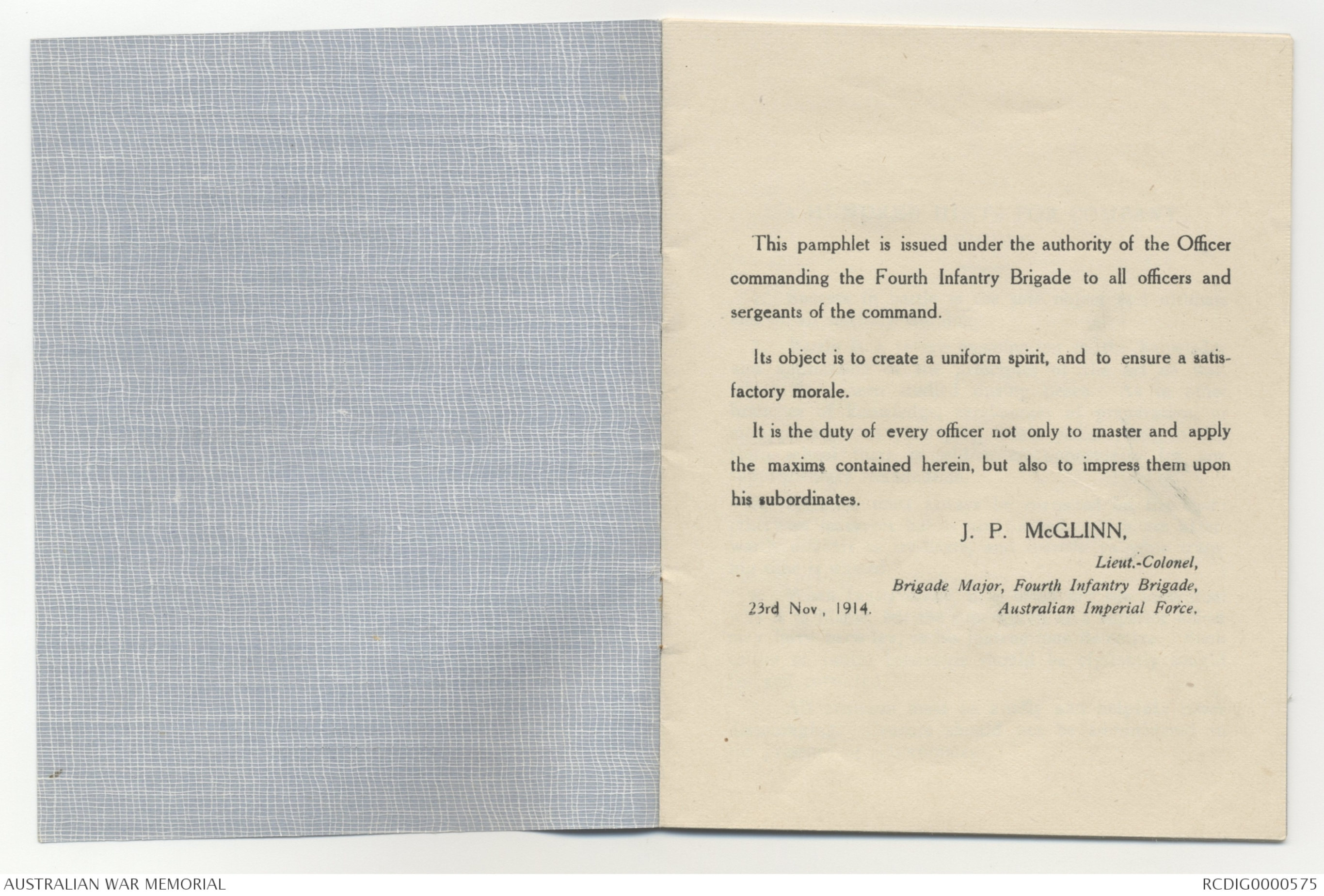
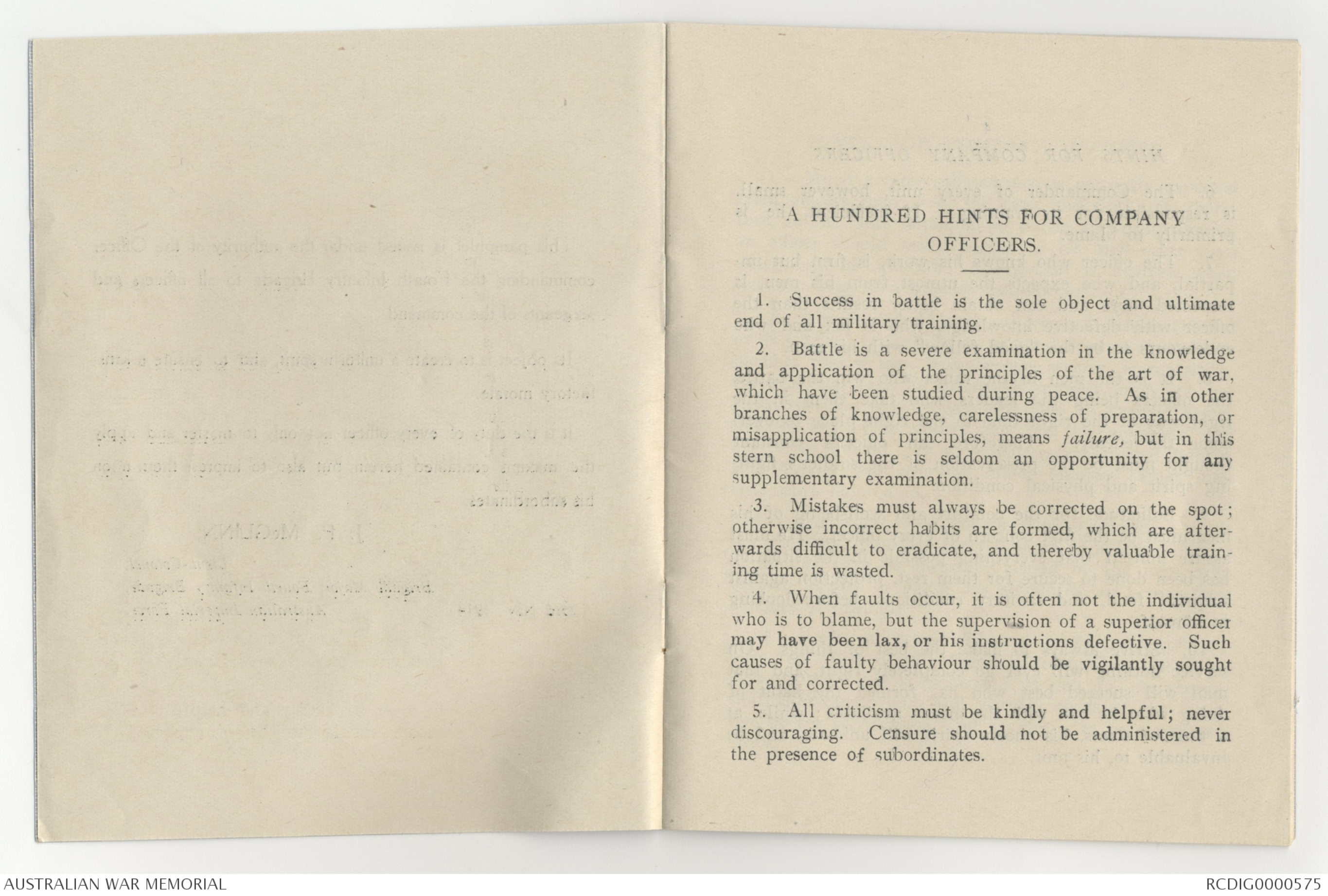
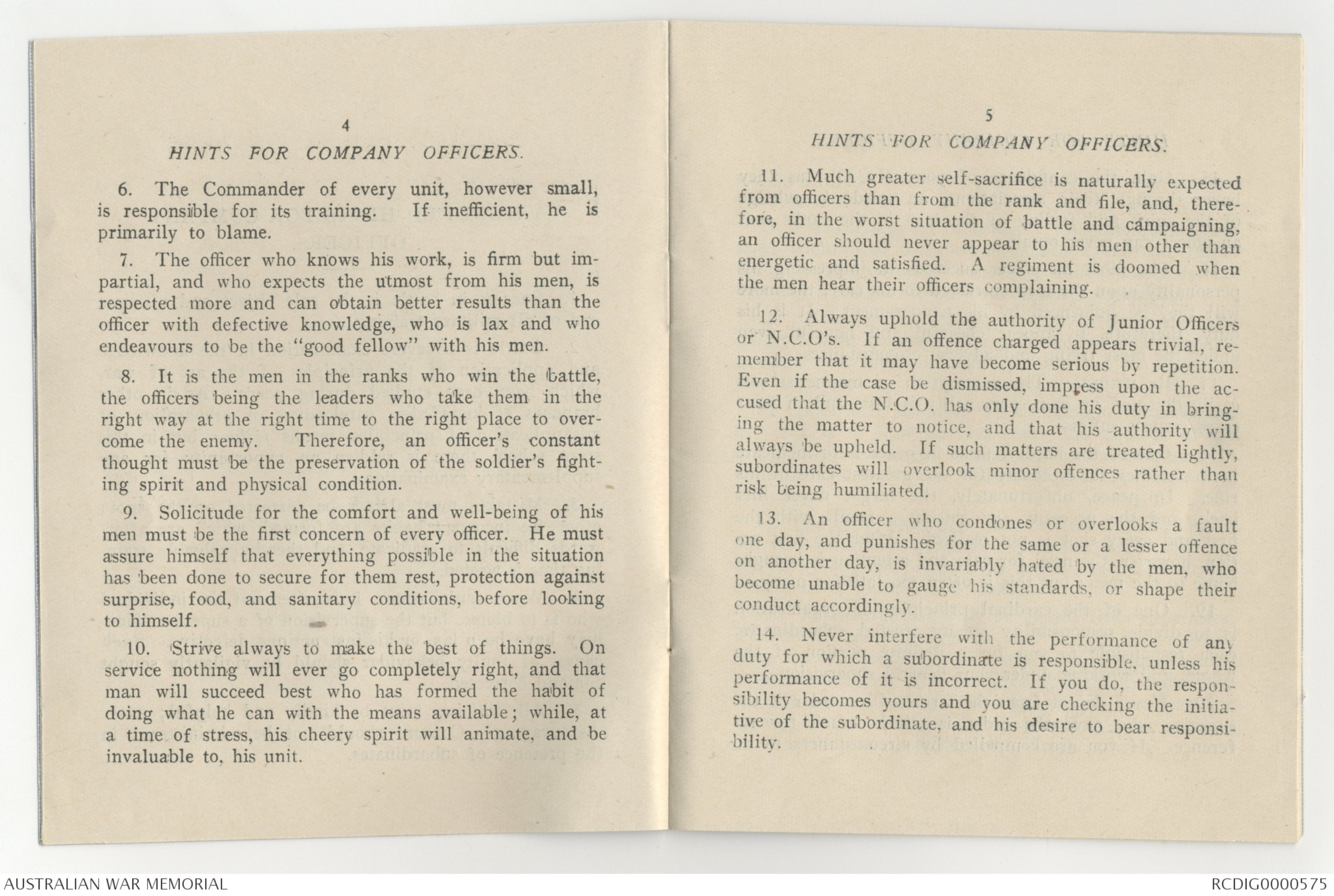
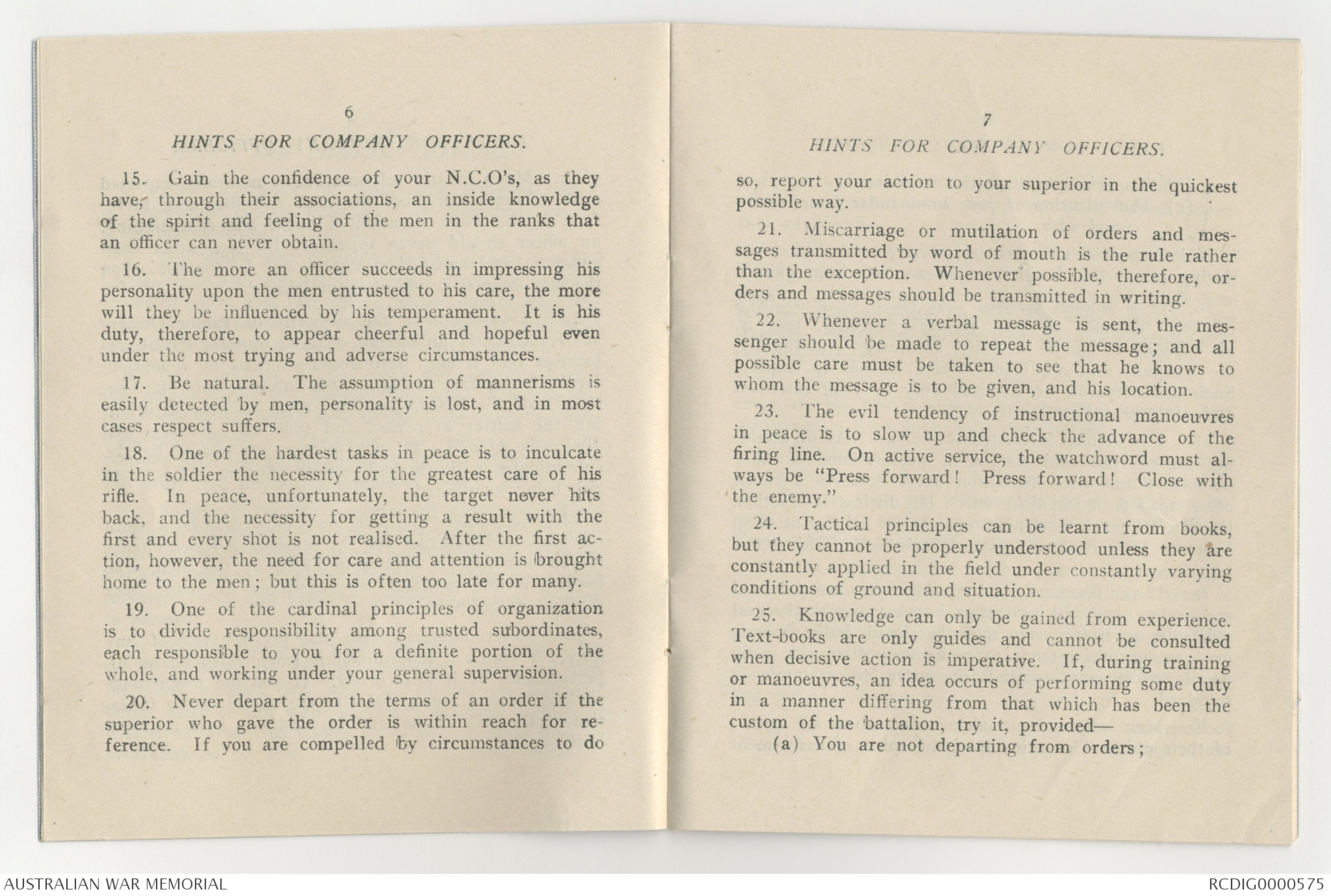
76. Men will never make difficulties about paying proper
"compliments" to a superior, if they are taught to understand that
this is nothing more than an acknowledgement of the authority invested
in the superior. The officer who does not insist that the proper
compliments are paid is doing more to undermine discipline than the
worst growler in the ranks; because his own men grow careless and
act similarly towards other officers.
77. Soldierly comradeship is marked by self-denial,mutual help,
mutual forbearance, loyalty, unselfishness and consideration. Such
qualities do not evolve spontaneously, (especially among men thrown
togther for the first time,) but must be sedulously fostered under all
circumstances. Good comradeship means effective co-operation in time
of stress.
78. During action your immediate commander, especially if at a
distance, constantly requires information, not/only about what is
happening, but also about what is not happening. It is your duty to kee
himsso informed.
79. A message always loses much of, and often the whole of its,
value if it fails to contain the date, time and place of despatch, and
the title of the sender's unit or appointment.
80. If a return in state is asked for at short notice, it is only
reasonable to assume that the shorter the time allowed for preparation
the greater the urgency for the required information to beiin your
Commander's possession.
81. If Cooks are rushed in the preparation of a meal owing to late
arrival in camp, or bivouac, extra assistance should be given them,
otherwise the men are kept hungry until late in the night.
82 Immediately on arrival in camp or bivouac, send an officer
or reliable N.C.O. to conduct your transport waggons to the lines. This
precaution will often save officers and men from going to bed supperless
2b.
83. Always see that your horses are attended to. Any trouble
in this respect will be amply repaid. Ill-fitting saddles and harness
are sources of cruelty to horses and should be specially guarded against.
Always dismount during halts, or when wartering horses.
84. In camp, bivouac and on the march see that cut-offs of rifles ar
closed and safety catches pressed to the rear. Such precautions will
often prevent accident and during night operations will prevent the
position of your force being disclosed by a stray shot.
85. Always conserve your ammunition; waste may mean disaster. Pri[[o?]]
to marching from camp or bivouac organise a drive through your lines to
look for and gather up stray ammunition.
86. Abstain from drinking water on the march; a clean pebble carried
in the mouth will be found an aid to stave off thirst. All water should
first be examined by a Medical Officer, which if doubtful should be boil[[?]]
before being used. A picquet should be placed on the water carts to
prevent them being rushed, and the water wasted.
87 Impress upon all concerned, the absolute necessity of keeping
touch when carrying out advanced rear or flank guard work, and also
when marching at night.
88 Good marching and the covering of long distances, without undue
fatigue, depends on the observance of march discipline, which includes
adherence to uniform pace, preservation of distances and covering,
avoidance of dusty routes, periodical halts for rest and water, attentio[[?]]
to feet and the fitting of equipment.
89. If at any time you discover that the maps issued are at fault
always correct them and advise superior authority. For example maps
often show, say only two offset roads between two given points, but
actual movements over the ground will disclose three or four. In marching
great care must be exercised in identifying the road ordered to be followed.
3b.
90. If engaged in reconnaissance always disguise your patrol in such
a manner that in case of an encounter, all men cannot be shot or captured
and|that information can be speedily conveyed to your base.
91. Flank guards in moving between ridges must secure the farther
side of such ridges, so as to prevent ambush.
92 Keep off the skyline when occupying or reconnoitring elevated
positions and see that your outpost details and observation posts do
likewise. Skyline does not always mean the highest point of a hill or
ridge.
93 The composition of a column can be learned by observing the
different ways on which the dust raised by it's various parts appears.
Officers, N.C.Os and scouts should be well acquainted with these
differences, which practice in observation will soon teach.
94 When alarms are given by day or night, nothing is more essential
and conducive to morale, than the turn out of troops in absolute silence
and order. On these occasions, the fewer officers and N.C.O's giving
commands or instructions the better. If proper arrangements have been
made, there should be necessity for few commands prior to moving off .
95 The best way to meet a bayonet charge, is by a countercharge;
because a charging line has an advantage over a stationery line by
reason of its impetus.
96 When officers or other ranks become detached through illness
wounds or other reasons, a note of the fact should at once be made in
Company Records or Regimental Records . On their rejoining, this should
also be recorded with the date.
97 Entries regarding pay should be kept absolutely up to date.
Neglect of this essential, will result in endless confusion and immense
trouble to those responsible.xxxxxxxxxxxxxxxxxx
4b.
98. Strict attention should be paid to camp and personal hygiene.
Feet and toe-nails should receive special attention and hair should
be kept short. On every opportunity washing of person and clothing
should be encouraged. Keep your outpost positions just as sanitary,
and free from nuisance as you would the camp or bivouac.
99. A small bottle or flask of Tincture of lodine carried by the
sergeants or section commanders will be found invaluable in preventing
scratches, cuts or slight wounds from becoming septic, pending proper
treatment.
100. Be courteous, yet firm, with inhabitants of any town, village or
district. You will probably obtain more information/and assistance from
them than if you treat them harshly.
4b.
98. Strict attention should be paid to camp and personal hygiene.
Feet and toe-nails should receive special attention and hair should
be kept short. On every opportunity washing of person and clothing
should be encouraged. Keep your outpost positions just as sanitary,
and free from nuisance as you would the camp or bivouac.
99. A small bottle or flask of Tincture of Iodine carried by the
sergeants or section commanders will be found invaluable in preventing
scratches, cuts or slight wounds from becomung septic, pending proper
treatment.
100. Be courteous, yet firm with inhabitants of any town, village or
district. You will probably obtain more information/and assistance from
them than if you treat them harshly.
[*-/11/14*]
Australian Imperial Force
Fourth Infantry Brigade
________
A Hundred Hints
FOR
Company Officers
Printed and Published by
CRITCHLEY PARKER
"Mining Standard," Melbourne
This pamphlet is issued under the authority of the Officer
commanding the Fourth Infantry Brigade to all officers and
sergeants of the command.
Its object is to create a uniform spirit, and to ensure a
satisfactory morale.
It is the duty of every officer not only to master and apply
the maxims contained herein, but also to impress them upon
his subordinates.
J. P. McGLINN.
Lieut.-Colonel,
Brigade Major, Fourth Infantry Brigade,
23rd Nov. 1914. Australian Imperial Force.
A HUNDRED HINTS FOR COMPANY
OFFICERS.
_______
1. Success in battle is the sole object and ultimate
end of all military training.
2. Battle is a severe examination in the knowledge
and application of the principles of the art of war,
which have been studied during peace. As in other
branches of knowledge, carelessness of preparation, or
misapplication of principles, means failure, but in this
stern school there is seldom an opportunity for any
supplementary examination.
3. Mistakes must always be corrected on the spot;
otherwise incorrect habits are formed, which are afterwards
difficult to eradicate, and thereby valuable training
time is wasted.
4. When faults occur, it is often not the individual
who is to blame, but the supervision of a superior officer
may have been lax, or his instructions defective. Such
causes of faulty behaviour should be vigilantly sought
for and corrected.
5. All criticism must be kindly and helpful; never
discouraging. Censure should not be administered in
the presence of subordinates.
4
HINTS FOR COMPANY OFFICERS.
6. The Commander of every unit, however small,
is responsible for its training. If inefficient, he is
primarily to blame.
7. The officer who knows his work, is firm but impartial,
and who expects the utmost from his men, is
respected more and can obtain better results than the
officer with defective knowledge, who is lax and who
endeavours to be the "good fellow" with his men.
8. It is the men in the ranks who win the battle,
the officers being the leaders who take them in the
right way at the right time to the right place to over-
come the enemy. Therefore, an officer's constant
thought must be the preservation of the soldiers' fighting
spirit and physical condition.
9. Solicitude for the comfort and well-being of his
men must be the first concern of every officer. He must
assure himself that everything possible in the situation
has been done to secure for them rest, protection against
surprise, food, and sanitary conditions, before looking
to himself.
10. Strive always to make the best of things. On
service nothing will ever go completely right, and that
man will succeed best who has formed the habit of
doing what he can with the means available; while, at
a time of stress, his cheery spirit will animate, and be
invaluable to, his unit.
5
HINTS FOR COMPANY OFFICERS.
11. Much greater self-sacrifice is naturally expected
from officers than from the rank and file, and, therefore,
in the worst situation of battle and campaigning,
an officer should never appear to his men other than
energetic and satisfied. A regiment is doomed when
the men hear their officers complaining.
12. Always uphold the authority of Junior Officers
or N.C.O's. If an offence charged appears trivial, re-
member that it may have become serious by repetition.
Even if the case be dismissed, impress upon the accused
that the N.C.O. has only done his duty in bringing
the matter to notice, and that his authority will
always be upheld. If such matters are treated lightly,
subordinates will overlook minor offences rather than
risk being humiliated.
13. An officer who condones or overlooks a fault
one day, and punishes for the same or a lesser offence
on another day, is invariably hated by the men, who
become unable to gauge his standards, or shape their
conduct accordingly.
14. Never interfere with the performance of any
duty for which a subordinate is responsible, unless his
performance of it is incorrect. If you do, the responsibility
becomes yours and you are checking the initiative
of the subordinate, and his desire to bear responsibility.
6
HINTS FOR COMPANY OFFICERS.
15. Gain the confidence of your N.C.O's, as they
have, through their associations, an inside knowledge
of the spirit and feeling of the men in the ranks that
an officer can never obtain.
16. The more an officer succeeds in impressing his
personality upon the men entrusted to his care, the more
will they be influenced by his temperament. It is his
duty, therefore, to appear cheerful and hopeful even
under the most trying and adverse circumstances.
17. Be natural. The assumption of mannerisms is
easily detected by men, personality is lost, and in most
cases respect suffers.
18. One of the hardest tasks in peace is to inculcate
in the soldier the necessity for the greatest care of his
rifle. In peace, unfortunately, the target never hits
back, and the necessity for getting a result with the
first and every shot is not realised. After the first action,
however, the need for care and attention is brought
home to the men ; but this is often too late for many.
19. One of the cardinal principles of organization
is to divide responsibility among trusted subordinates,
each responsible to you for a definite portion of the
whole, and working under your general supervision.
20. Never depart from the terms of an order if the
superior who gave the order is within reach for reference.
If you are compelled by circumstances to do
7
HINTS FOR COMPANY OFFICERS.
so, report your action to your superior in the quickest
possible way.
21. Miscarriage or mutilation of orders and mes-
sages transmitted by word of mouth is the rule rather
than the exception. Whenever possible, therefore, orders
and messages should be transmitted in writing.
22. Whenever a verbal message is sent, the messenger
should be made to repeat the message; and all
possible care must be taken to see that he knows to
whom the message is to be given, and his location.
23. The evil tendency of instructional manoeuvres
in peace is to slow up and check the advance of the
firing line. On active service, the watchword must al-
ways be "Press forward! Press forward! Close with
the enemy."
24. Tactical principles can be learnt from books,
but they cannot be properly understood unless they are
constantly applied in the field under constantly varying
conditions of ground and situation.
25. Knowledge can only be gained from experience.
Text-books are only guides and cannot be consulted
when decisive action is imperative. If, during training
or manoeuvres, an idea occurs of performing some duty
in a manner differing from that which has been the
custom of the battalion, try it, provided—
(a) You are not departing from orders;
 Jacqueline Kennedy
Jacqueline KennedyThis transcription item is now locked to you for editing. To release the lock either Save your changes or Cancel.
This lock will be automatically released after 60 minutes of inactivity.